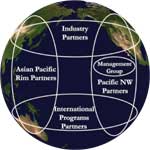UO Receives NSF Grant to Internationalize Computer Science Education

A team of UO faculty has received a grant from the National Science Foundation for a two year project which will explore new models for undergraduate computer science curriculum that better prepare students to work in a global community of computing professionals. The project is also supported by a similar grant for a group of faculty from Portland State University.
A team of CIS faculty, Arthur Farley, Sarah Douglas, Virginia Lo, Andrzej Proskurowski and Michal Young developed the project proposal, meeting once a week over a period of four months and working additional hours individually. In July of 2007, UO and PSU received collaborative grants totaling more than $500,000 to fund the project.
Over the course of the project, faculty and industry representatives will meet and discuss ways to transform the education of computer science students who might some day be collaborating with their counterparts in Pacific Rim countries.
Andrzej Proskurowski, principal investigator for the grant, has experience in adapting to new cultures in his career. Proskurowski grew up in Poland, received his doctorate in Sweden and has taught at the UO since 1975. "Because of my background and experiences, I am aware of the impact of culture shock and the need for cultural awareness and sensitivity. As the practice of computer science becomes even more global, the challenge of adjusting the way we teach it to take these factors into consideration is quite formidable," Proskurowski said.
The UO team along with faculty from Portland State and Willamette organized a planning meeting in Portland November 9-11, 2007 as a first step to develop community, assess needs and exchange ideas on internationalizing computer science curriculum. The thirty participants at the workshop represented eleven Pacific Northwest colleges and universities and five companies, including Microsoft, Intel and IBM.
Pacific Northwest and Asian computer scientists and industry representatives will meet at the initial community workshop in Portland May 18-20, 2008 to address questions such as What are the talents and skills needed in tomorrows global workforce? and What are the barriers to international collaboration in industry and science?
The participants will brainstorm with their partners about curriculum changes which will prepare students for jobs which require knowledge of other cultures, jobs which involve long distance collaboration and projects which require understanding of other cultures. As an example of the type of change that might occur, a course such as the UO's senior level software engineering class might be modified to give students the opportunity to collaborate with students from a Pacific Rim university on a class project, with teams working at their home universities and communicating over the internet using distance conferencing technology.
A second workshop is planned for October in Beijing (co-sponsored by Peking University) which will focus on developing teaching methodologies and course curricula which address the needs identified in earlier workshops.